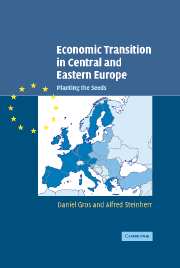Book contents
- Frontmatter
- Contents
- List of figures
- List of boxes
- List of tables
- Acknowledgements
- Introduction
- Part I The rise and decline of communism: an overview
- 1 From pre-war Russia to the fall of communism
- 2 The obsession with growth
- Part II Transition: 1990–2000
- Part III Extreme cases for reform: scope for disagreements
- Part IV The new Europe from the Atlantic to the Urals
- References
- Index
1 - From pre-war Russia to the fall of communism
Published online by Cambridge University Press: 05 June 2012
- Frontmatter
- Contents
- List of figures
- List of boxes
- List of tables
- Acknowledgements
- Introduction
- Part I The rise and decline of communism: an overview
- 1 From pre-war Russia to the fall of communism
- 2 The obsession with growth
- Part II Transition: 1990–2000
- Part III Extreme cases for reform: scope for disagreements
- Part IV The new Europe from the Atlantic to the Urals
- References
- Index
Summary
Ever since the socialist takeover in Russia a debate has been raging about the profundity of the changes imposed on Russian society. However, looking back on Russia's history since Peter the Great, we find that many features of Russian pre-revolutionary society survived, and indeed were sometimes reinforced, after the Revolution. The Soviet Union remained an empire with its border problems and nationality conflicts, and continued to police its population severely. Democracy was as absent and repression as regular after as before the Revolution. State organisation remained highly centralised and the problems of the periphery were, as always, ignored, misunderstood or repressed. Within the imperial borders the conflict between town and country was as acute in the 1930s as in the seventeenth century. The leadership remained divided between imperial expansion eastwards or westwards, and between opening up to or closing off foreign, mostly Western, influences. The empire invariably rooted its strength in strong ideological grounds: in pre-revolutionary days in absolute monarchy and religion and afterwards in the Marxist framework. Both regimes, each claiming to pursue a superior mission, had expansionary goals for which a strong and influential military was necessary. The need to equip the military, more than the desirability of improving the welfare of citizens, was in each case the driving force behind industrialisation.
- Type
- Chapter
- Information
- Economic Transition in Central and Eastern EuropePlanting the Seeds, pp. 13 - 40Publisher: Cambridge University PressPrint publication year: 2004
- 1
- Cited by



